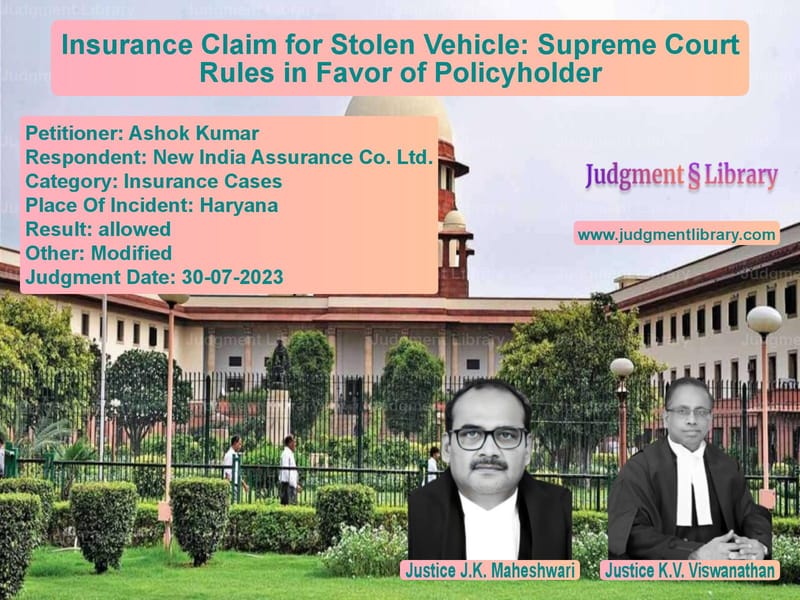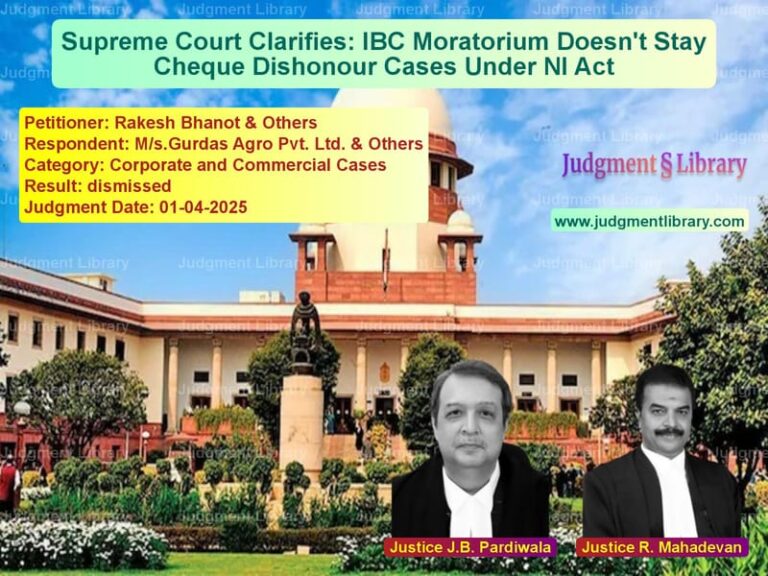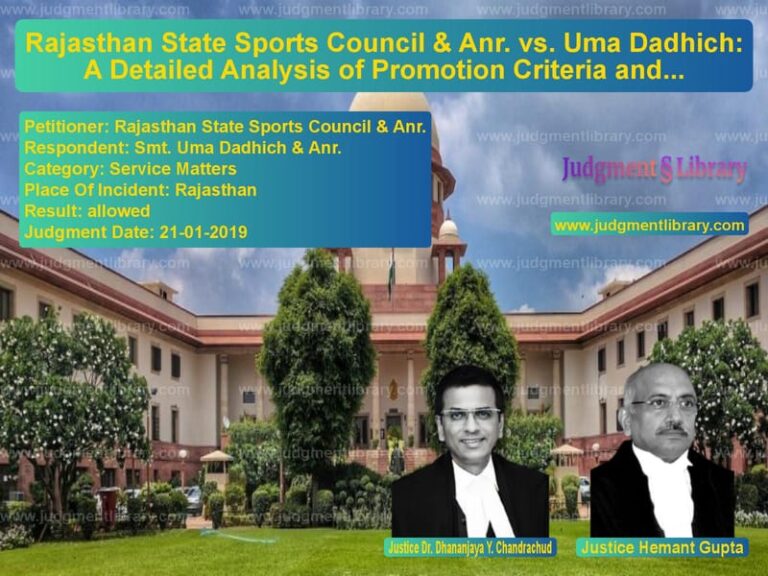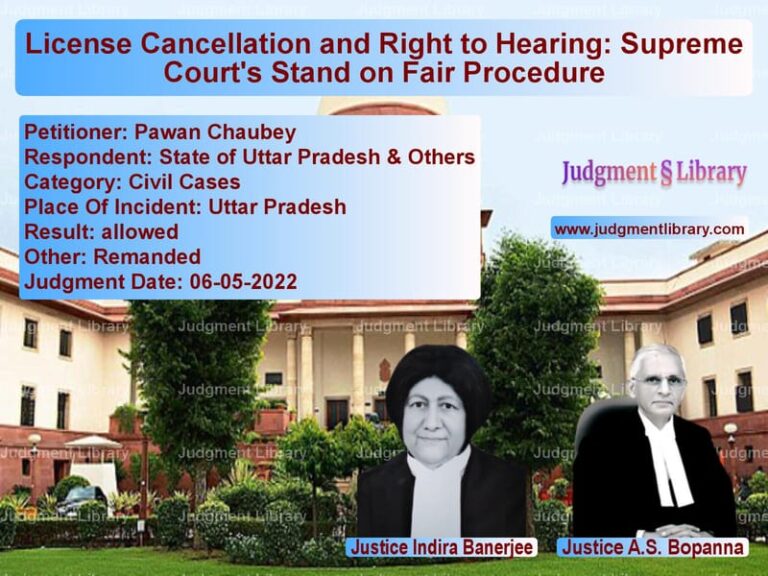Insurance Claim for Stolen Vehicle: Supreme Court Rules in Favor of Policyholder
The case of Ashok Kumar v. New India Assurance Co. Ltd. revolves around a disputed insurance claim for a stolen vehicle. The Supreme Court ruled in favor of the policyholder, directing the insurance company to settle the claim on a non-standard basis after it was wrongfully repudiated. This judgment reinforces the principle that insurers cannot deny claims arbitrarily and must adhere to established consumer protection norms.
Background of the Case
The dispute began when the appellant, Ashok Kumar, filed a claim for the theft of his truck (dumper) bearing Registration No. HR-55C-5385. The vehicle was insured under Policy No. 354101/31/07/01/00013342 for a sum of Rs. 8,40,000, covering the period from February 20, 2008, to February 19, 2009.
On June 26, 2008, the truck was stolen while it was parked unattended with the key left in the ignition. The appellant’s driver, Mam Chand, had left the vehicle momentarily to ask for directions at Mittal’s Farm. When he returned, the truck was gone. An FIR was lodged the next day, and the insurance company was informed on July 2, 2008. However, the insurer later repudiated the claim, citing a violation of policy conditions due to the driver’s negligence.
Key Legal Issues
- Was the insurance company justified in rejecting the claim on the grounds of negligence?
- Did the policyholder comply with the requirements of reporting the theft?
- Should the claim have been settled on a non-standard basis?
Petitioner’s (Ashok Kumar’s) Arguments
The petitioner argued:
- He had promptly informed the police and the insurance company about the theft.
- The rejection of the claim was unjustified as the theft occurred despite reasonable precautions.
- The insurer had acted arbitrarily by repudiating the claim on minor technical grounds.
- Consumer protection laws required the insurer to settle the claim at least on a non-standard basis.
Respondent’s (New India Assurance Co. Ltd.) Arguments
The insurance company defended its decision, stating:
- The driver had left the vehicle unattended with the key in the ignition, violating Condition No. 5 of the policy.
- The policyholder delayed informing the insurer about the theft, violating Condition No. 1.
- Since there was a breach of policy terms, the claim was not payable.
Supreme Court’s Observations
The Supreme Court carefully examined the case and found that the insurer had acted unfairly. The Court made several key observations:
On Reporting the Theft
The Court noted that the policyholder had promptly reported the theft to the police, which was the primary requirement under Condition No. 1. The insurance company’s reliance on a minor delay in informing them was unjustified. The Court referenced the precedent set in Jaina Construction Co. v. Oriental Insurance Co. Ltd., where it was held that delay in informing the insurer cannot be used as an excuse to deny a genuine claim.
On Leaving the Key in the Ignition
The Court rejected the insurer’s argument that leaving the key in the ignition was a fundamental breach of the policy. It ruled:
“It cannot be said that leaving the key in the ignition was an open invitation to theft. The theft was an independent criminal act and should not be used to deny the claim.”
The Court cited Nitin Khandelwal v. National Insurance Co. and Amalendu Sahoo v. Oriental Insurance Co., which held that insurers should settle claims on a non-standard basis even if there is a minor policy violation.
On Non-Standard Settlement
The Court emphasized that while there was a minor lapse on the policyholder’s part, it did not justify a total rejection of the claim. It applied the IRDA guidelines, which allow for settlement of claims at 75% of the insured amount in such cases.
Final Judgment
The Supreme Court ruled:
- The insurance company’s rejection of the claim was unjustified.
- The claim should be settled at 75% of the insured amount (Rs. 8,40,000), as per IRDA norms.
- The insurance company must pay the claim along with applicable interest.
Implications of the Judgment
This ruling has significant implications for policyholders and the insurance industry:
- Protection of Consumer Rights: Insurers cannot use technicalities to deny legitimate claims.
- Fair Interpretation of Policy Terms: Minor violations should not lead to total claim repudiation.
- Encouraging Accountability: Insurers must act in good faith and follow IRDA guidelines.
Conclusion
The Supreme Court’s decision in Ashok Kumar v. New India Assurance Co. Ltd. reinforces the principle that insurance claims should be assessed fairly and policyholders should not be penalized for minor lapses. This landmark ruling serves as a reminder to insurers that they must act in good faith and comply with consumer protection laws.
Petitioner Name: Ashok Kumar.Respondent Name: New India Assurance Co. Ltd..Judgment By: Justice J.K. Maheshwari, Justice K.V. Viswanathan.Place Of Incident: Haryana.Judgment Date: 30-07-2023.
Don’t miss out on the full details! Download the complete judgment in PDF format below and gain valuable insights instantly!
Download Judgment: ashok-kumar-vs-new-india-assurance-supreme-court-of-india-judgment-dated-30-07-2023.pdf
Directly Download Judgment: Directly download this Judgment
See all petitions in Motor Insurance Settlements
See all petitions in Insurance Settlements
See all petitions in Judgment by J.K. Maheshwari
See all petitions in Judgment by K.V. Viswanathan
See all petitions in allowed
See all petitions in Modified
See all petitions in supreme court of India judgments July 2023
See all petitions in 2023 judgments
See all posts in Insurance Cases Category
See all allowed petitions in Insurance Cases Category
See all Dismissed petitions in Insurance Cases Category
See all partially allowed petitions in Insurance Cases Category







